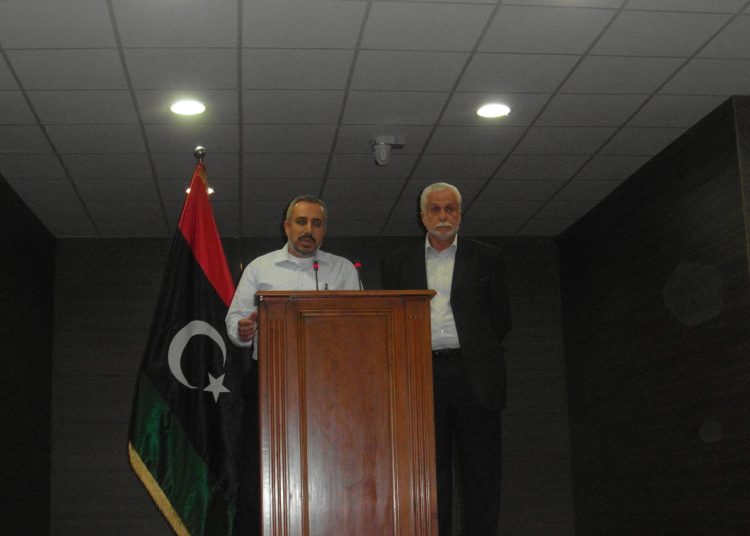![Housing and Utlities Minister Ali Sherief (left) revealed that legal reasons prevented . . .[restrict]Libyan companies from completing stalled projects (photo:Sami Zaptia).](http://www.libyaherald.com/wp-content/uploads/2013/05/govt-photo.png)
By Sami Zaptia.
Tripoli, 11 May 2013:
Asked by Libya Herald why the government was not pushing forward with using local companies to complete many of the nearly finished housing projects, Housing and Utilities Minister Ali Sherief admitted that the government’s hands were tied by UN Resolution 1973.
Speaking at a press conference called for 8 pm on Friday in response to the collapse of a building in the Italian colonial era built district of Belkhair, at which 5 people died, Sherief said that his government could not move too fast for legal reasons.
The Minister had revealed that temporary prefabricated buildings were going to be constructed in the short term in order to deal with the current housing shortage. He also revealed that the government was preparing alternative plans involving the use of the local construction companies to help supply the acute demand for housing.
Libya Herald then asked the Minister why was it that many of the stalled housing projects awaiting the return of foreign contractors, that were 70-80 percent complete, could not be handed over to local Libyan construction companies for completion.
The point being that as long as foreign construction companies perceived the situation in Libya as being unsafe, the housing crises was going to continue. However, local Libyan companies could be handed over some of the apartment blocks, for example the ones on Airport Road, that look complete, for actual completion. This would help relieve the housing crisis, as opposed to the building of temporary prefabricated housing.
“Resolution 1973 says there must be compensation for companies. We cannot act quickly. Legally, we must give them (foreign construction companies) enough time and opportunity to return and continue their projects”, Minister Sherief revealed.
However, he did go on and reveal that the government was “studying this” option of allowing local Libyan companies to complete incomplete projects, if foreign companies refuse to return.
Minister Sherief also noted that Libya’s acute housing crisis was also exacerbated by the fact that the Urban Planning Authority had not completed its long awaited and latest so-called 3G Master Plan. This plan sets out spaces in Tripoli and the rest of the country for housing, commercial, industrial and agricultural use.
Libya Herald also pointed out to the Minister that without the release of the 3G Master Plan, the government could not in practical terms launch any new housing projects to alleviate the current acute housing problem.
Minister Sherief replied that the government was thinking of “opening new areas for development. We are thinking of creating new residential areas or satellite towns. We will also open up newly planned areas for development”, he concluded. [/restrict]







